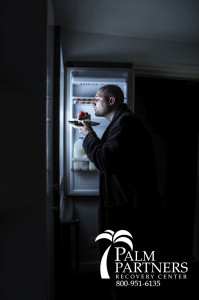“Our obsession with appearance, our fixation on diet and our food- and information-abundant culture have given rise to an epidemic of unhealthy relationships with food,” says Michelle May, MD, author of Eat What You Love, Love What You Eat. “Food has become our focus instead of being the fuel for a full life.”
Here are 8 signs you have an unhealthy relationship with food.
1: You ‘eat your feelings’
There’s a difference between physical hunger and emotional hunger. If you always reach for your comfort food(s) at the first sign of feeling something you don’t want to feel, such as sadness, loneliness, or depression – or if you look to food to enhance feelings you’re experiencing, such as joy and excitement – this is a sign that you have an unhealthy relationship with food.
2: You eat when you’re bored
Likewise, if you reach for the snacks simply because you don’t know what else to do with your hands, then you probably think about food as something other than what it truly is: fuel for living (see #4).
3: You think of food as a reward
I know I have been guilty of this one in the past. I used to *try* to deprive myself of dessert, telling myself I didn’t need the calories. But, my next thought would always be, “But, I’m a good person, why should be punished by not allowing myself to have that piece of cake?” It’s obvious to me now just how screwed up my attitude towards food was…and still is, sometimes.
4: You don’t understand the concept of ‘food-as-fuel’
Although you can certainly enjoy food, its main purpose is to fuel the body. I realized that I had an unhealthy relationship with food when I couldn’t understand how other people could just eat what was necessary for their body at the time and not overindulge.
Dr. May says, “Before eating, pause to ask yourself, Does my body need fuel? Why am I thinking about food if my body doesn’t need it?” She adds, “If you do need to eat, listen to your cravings: Indulging a little now can keep you from overdoing it later.”
5: You eat even when you’re already full
There’s no real feeling of being satiated by a meal. Even if you feel full, you continue to eat because you still don’t feel satisfied; there’s still a feeling of something missing that you hope to fill with more food.
6: Your activities revolve around eating
Whereas things used to revolve around alcohol and other drugs, you now equate socializing with going out to eat.
7: You have stringent rules
You are super rigid about what you can and can’t eat but, “this kind of rigidity is all about fear of losing control,” says Susan Albers, PsyD, author of 50 Ways to Soothe Yourself Without Food. She adds that, “Rule-based eating doesn’t take hunger and cravings into account.” And all of this is just setting yourself up for a fall. Besides, it’s also an indication of the obsession that you have when it comes to food and eating. If you’re always counting calories, then you’re being consumed by your unhealthy relationship with food.
8: You’re dyingggg to be thin (maybe even literally)
Just like any other relationship, an unhealthy one is full of deception. If you tell yourself you’re doing a cleanse or a fast, or that you’re going to start juicing because you’re doing it for the antioxidants but you’re really doing it because you heard it’ll make you drop weight quickly, you’re playing with fire.
Depriving yourself of crucial nutrients, or only allowing yourself to eat a select few (orthorexia) and pretending it’s healthy is a dangerous game. And ironically, it can cause a backlash of weight gain by perpetuating the whole vicious cycle of “starve, binge, hate yourself.”
If you or someone you love is struggling with substance abuse, addiction, or food addiction, please call toll-free 1-800-951-6135.
